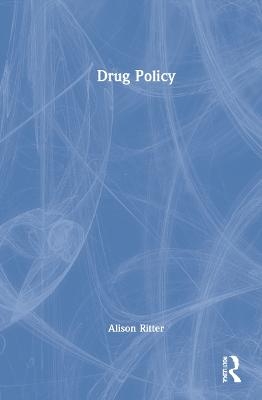
Drug Policy
Seiten
2021
Routledge (Verlag)
978-1-032-12426-1 (ISBN)
Routledge (Verlag)
978-1-032-12426-1 (ISBN)
Taking a multidisciplinary perspective (including public health, sociology, criminology, and political science amongst others), and using examples from across the globe, this book provides a detailed understanding of the contested nature of drug policy, drug policy making and the theoretical perspectives that inform the study of drug policy.
Taking a multidisciplinary perspective (including public health, sociology, criminology, and political science amongst others) and using examples from across the globe, this book provides a detailed understanding of the complex and highly contested nature of drug policy, drug policy making, and the theoretical perspectives that inform the study of drug policy. It draws on four different theoretical perspectives: evidence-informed policy, policy process theories, democratic theory, and post-structural policy analysis.
The use and trade in illegal drugs is a global phenomenon. It is viewed by governments as a significant social, legal, and health problem that shows no signs of abating. The key questions explored throughout this book are what governments and other bodies of social regulation should do about illicit drugs, including drug policies aimed at improving health and reducing harm, drug laws and regulation, and the role of research and values in policy development. Seeing policy formation as dynamic iterative interactions between actors, ideas, institutions, and networks of policy advocates, the book explores how policy problems are constructed and policy solutions selected, and how these processes intersect with research evidence and values. This then animates the call to democratise drug policy and bring about inclusive meaningful participation in policy development in order to provide the opportunity for better, more effective, and value-aligned drug policies.
This book will be of great interest to students and scholars of drug policy from a number of disciplines, including public health, sociology, criminology, and political science.
Taking a multidisciplinary perspective (including public health, sociology, criminology, and political science amongst others) and using examples from across the globe, this book provides a detailed understanding of the complex and highly contested nature of drug policy, drug policy making, and the theoretical perspectives that inform the study of drug policy. It draws on four different theoretical perspectives: evidence-informed policy, policy process theories, democratic theory, and post-structural policy analysis.
The use and trade in illegal drugs is a global phenomenon. It is viewed by governments as a significant social, legal, and health problem that shows no signs of abating. The key questions explored throughout this book are what governments and other bodies of social regulation should do about illicit drugs, including drug policies aimed at improving health and reducing harm, drug laws and regulation, and the role of research and values in policy development. Seeing policy formation as dynamic iterative interactions between actors, ideas, institutions, and networks of policy advocates, the book explores how policy problems are constructed and policy solutions selected, and how these processes intersect with research evidence and values. This then animates the call to democratise drug policy and bring about inclusive meaningful participation in policy development in order to provide the opportunity for better, more effective, and value-aligned drug policies.
This book will be of great interest to students and scholars of drug policy from a number of disciplines, including public health, sociology, criminology, and political science.
Alison Ritter, AO is Professor and Director of the Drug Policy Modelling Program at UNSW Sydney. She leads multi-disciplinary drug policy research, is Editor of the International Journal of Drug Policy, and works extensively with governments on drug policy problems.
Acknowledgements A Note On Terminology 1. Drug Policy, An Introduction 2. Drug Policies To Improve Health And Reduce Harm 3. Drug Policies As Laws And Regulations, And Their Policing 4. Improving Drug Policy Choices: The Role Of Research Evidence 5. Analysing Drug Policy Formation 6. Analysing The Discursive Effects Of Drug Policy 7. Influencing Drug Policy: Making Change Happen 8. Democratising Drug Policy
| Erscheinungsdatum | 01.12.2021 |
|---|---|
| Verlagsort | London |
| Sprache | englisch |
| Maße | 156 x 234 mm |
| Gewicht | 394 g |
| Themenwelt | Recht / Steuern ► Allgemeines / Lexika |
| Recht / Steuern ► Arbeits- / Sozialrecht ► Sozialrecht | |
| Recht / Steuern ► EU / Internationales Recht | |
| Recht / Steuern ► Strafrecht ► Kriminologie | |
| Sozialwissenschaften ► Soziologie | |
| ISBN-10 | 1-032-12426-1 / 1032124261 |
| ISBN-13 | 978-1-032-12426-1 / 9781032124261 |
| Zustand | Neuware |
| Informationen gemäß Produktsicherheitsverordnung (GPSR) | |
| Haben Sie eine Frage zum Produkt? |
Mehr entdecken
aus dem Bereich
aus dem Bereich
Textausgabe mit ausführlichem Sachverzeichnis
Buch | Softcover (2024)
dtv Verlagsgesellschaft
20,90 €
meine Rechte: Wohnen, Arbeiten, Steuern, Mobilität
Buch | Softcover (2024)
C.H.Beck (Verlag)
11,90 €


